I met Kai Braun, a young ref and also a foilist at the 2024 Australian and Oceania Junior Championship in Fencing Victoria’s Ref Room, he had just competed at the Men’s Junior event just a day ago. We casually discussed how he trains as I was curious about methods on refining a particular technique. This conversation became an idea and turned into a concept. Five months later I gave this concept a title TOUCHPOINT !
Furthermore, we briefly chatted about his experience as a fencer who has gone into becoming a referee while still have time to train in fencing and study in university. His participation in the sport as a ref is both rewarding and supplement to lifelong learning.
Subject: Kai Braun (Ref for QLD state and national comps)
Author / Photographer: Ed Chiu
Date: April 2024
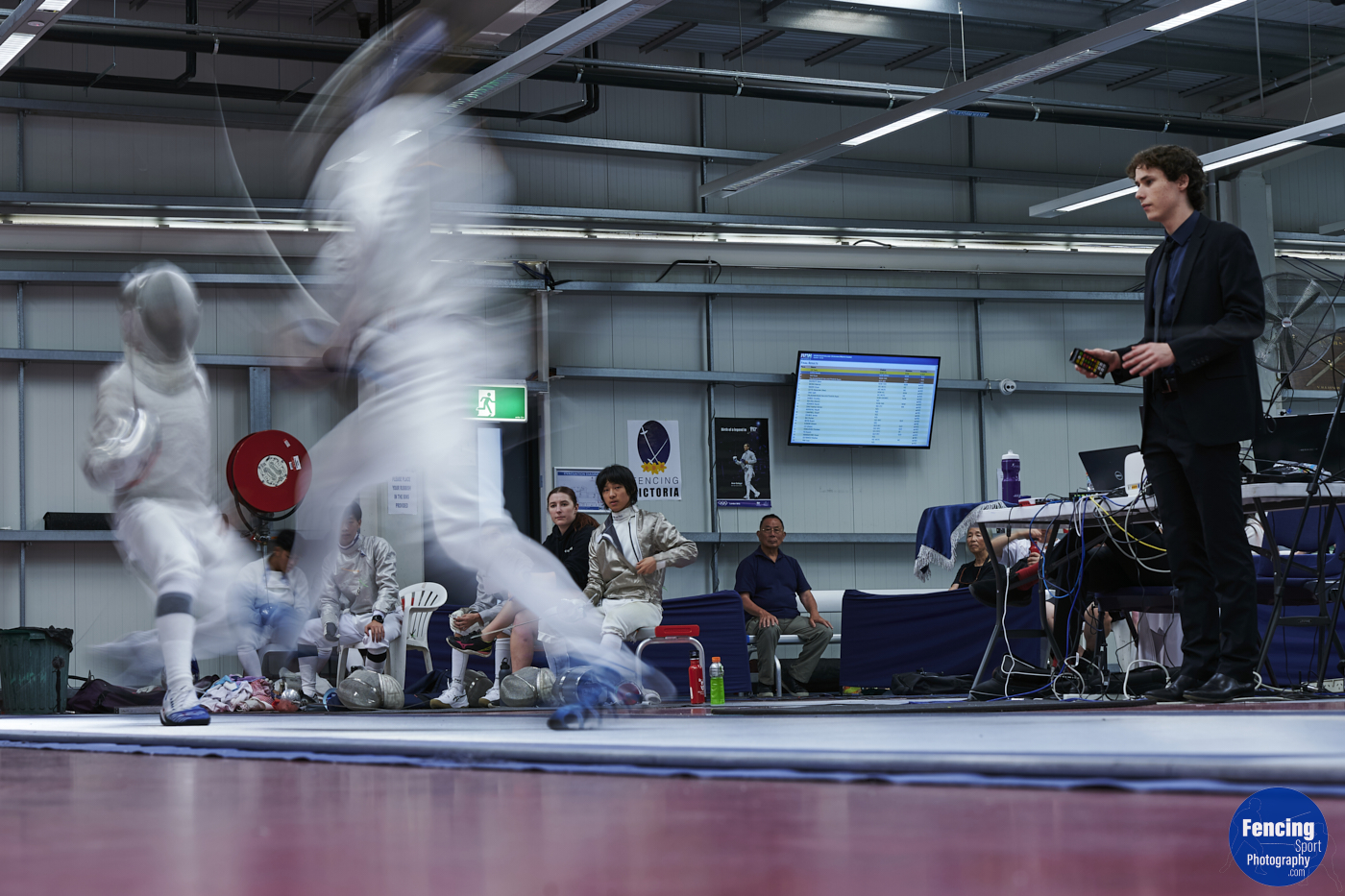
Ed: How did you hear about taking up the opportunity to be a referee in fencing?
Kai: Michael Nelson, a senior AFF ref who goes to my club recommended that I do state and then national accreditations for refereeing at the end of 2022/ start of 2023.
Ed: So State and National the same accreditation or different, can people just do state and not national ref?
Kai: You can absolutely just referee at a state level – in fact if you ever want to referee at a national level it is probably important to get a heap of experience refereeing state level events. Michael Nelson, with the help of QFA has recently created a really good training and assessment system for new referees.
Ed: How does being a ref benefit your fencing and do you have to fence the weapon that you ref in?
Kai: Reffing really benefits my fencing, I feel like since refereeing I have a much better sense of priority. Additionally, I feel like it’s easier to ‘see’ the match from the referee’s perspective while I’m fencing and I can use that to gain an advantage. However reffing the day before I compete can be quite tiring sometimes.
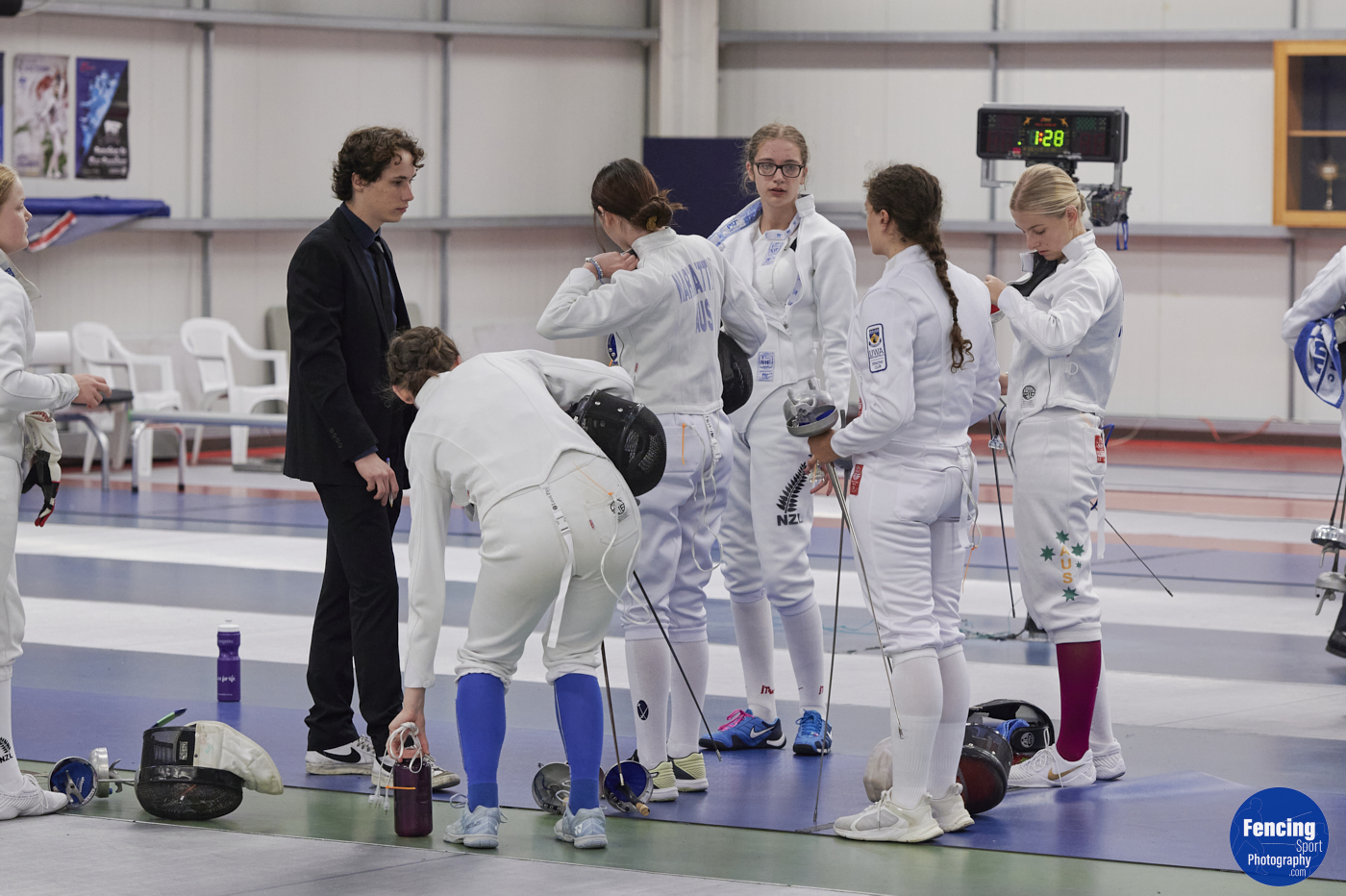
Ed: Briefly walk me through process of becoming a ref
Training: Kai: The training I did was pretty much just reffing at club and having Nelson give me feedback.
Being a trainee ref at a real comp: Kai: Being a trainee ref at a real comp didn’t really exist for me at least at a national level — at the Brisbane AFC last year we were short on refs so after Howard observed me refereeing Women Sabre for about an hour, I was thrown into Men Sabre by myself.
Taking off the training wheel: Kai: I feel like at U15/17 Nats last year, which was the first competition I reffed more important matches myself, that was when the training wheels fully came off. That being said I still like to think I’m constantly learning and getting feedback from better refs like Nelson, Sam, Lucas, Blake, Clayton etc.
Full confidence to ref on your own: Kai: To be honest gaining confidence is just a matter of repetition and reffing more. I would say I’m gaining confidence, but I still get nervy before I referee the matches I know that are going to be tough/important.
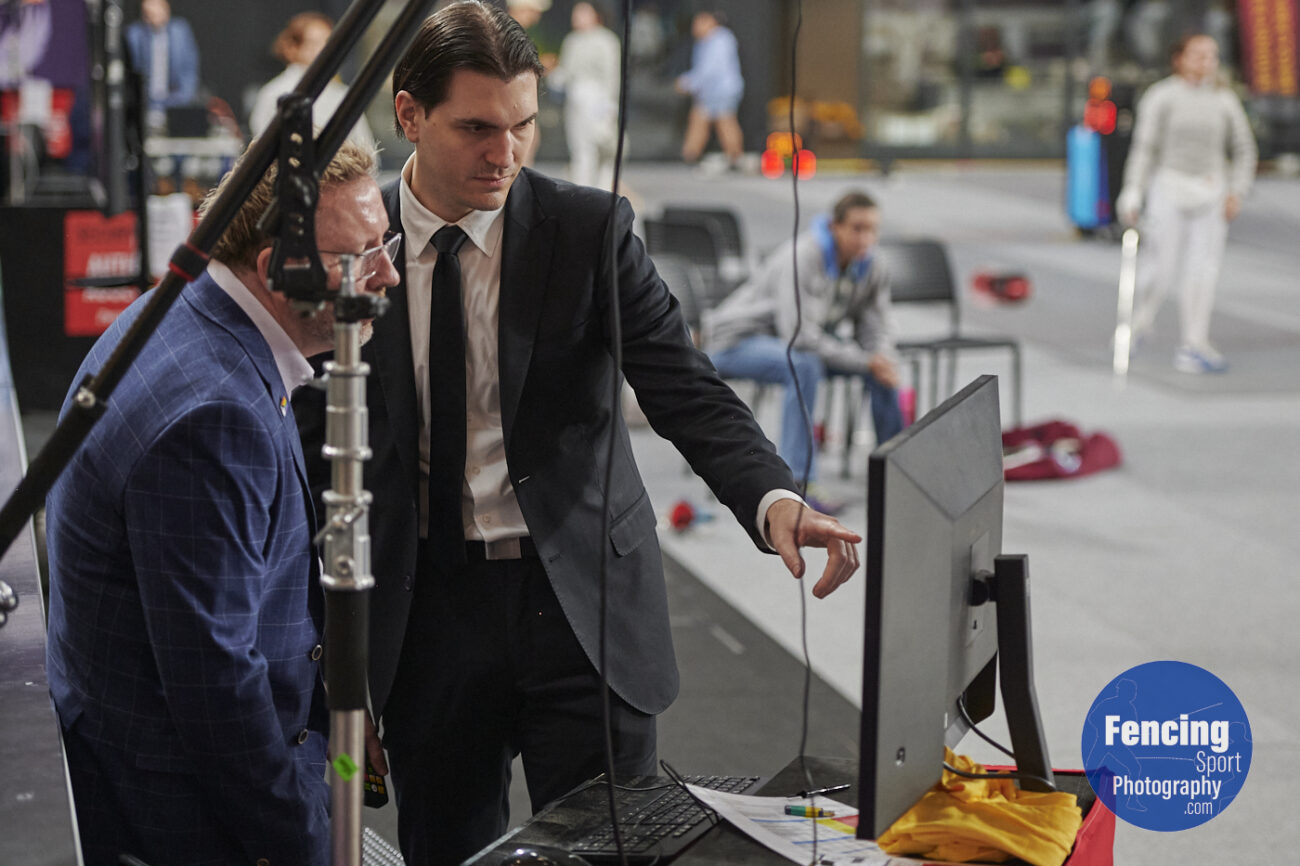
Ed: In comps do you ever get questions from young fencers or new fencers who didn’t know you are also a fencer?
Kai: Definitely younger (u15) fencers have come up and asked me if I’ve fenced before. That being said I was also unaware (until I started reffing with them) that Clayton and Blake were also exceptional foilists (a lot better than me), as both of them have medalled at AFC events. Again, most of the strong senior referees were at some point very competitive fencers (Nelson has medalled at epee AFCs, Lucas went to Olympic qualifiers etc).
Ed: Do you have to be a fencer or experienced or learn fencing to become a ref, if not, is it advisable to have learned how to fence?
Kai: I think that to reach a certain level of reffing you definitely need a background in competitive fencing — at least for most individuals. I think you could definitely learn how to ref without really fencing much, but it will be very difficult to become good at it.

“While I do think it is easier than foil & sabre, it is far from easy and going into epee matches with that attitude is a really good way to make some terrible calls”
Ed: What makes a good ref?
Kai: Having a ‘feeling’ for priority (which is something I’m still trying to improve) is super important, rather than trying to ‘logic’ out a hit. The best referees in Australia I know (Blake and Nelson) have an unreal ability to instinctively feel who has priority.
Also just being able to be flexible and open to different interpretations of calls is important.
Ed: How do you identify a bad ref?
Kai: I feel like a referee that lets the fencers walk over them, or spends too much time trying to justify themselves is a sign of inexperience. That being said I don’t think having a match that you screw up necessarily makes you a terrible ref – everyone has done it at some point (myself definitely included), but I think not being aware of your mistakes and actively trying to improve upon them may be a sign of a ‘bad’ referee.

Ed: For Sabre and Foil where the ref plays a big part, how do you stay neutral and make good decisions even if you know the fencer well?
Kai: Yeah, especially since Australian fencing is pretty small, I know most of the fencers. Since I went to Udine I now know all the Women Foilists (the event I probably referee the most). Now when I referee women’s Foil I try to keep a professional demeanour and not really interact with fencers in an event I’m refereeing during said event (outside of matches obviously).
Ed: With no priority rules in Epee, does that mean every fencing ref can do this with ease, given Epee has certain rules with the timer that Sabre don’t?
Kai: I think Epee has a reputation for being easy to referee. While I do think it is easier than Foil & Sabre, it is far from easy and going into Epee matches with that attitude is a really good way to make some terrible calls. Actions in Epee often happen super quickly after a long period of nothing really happening and identifying what occurred first in an action can be tough. Correctly choosing whether to award a hit, annul the touch or card can be tricky for some of the more ambiguous actions.
Ed: How has being a ref benefits you as a person, at work, uni and human relationships?
Kai: I think being a referee has shown me how to be more confident while still being flexible/willing to change my opinion on things. More importantly, it’s very rewarding as I feel like it’s a way for me to give back to a sport that has given me so much.
Ed: On your recent trip to Melbourne travelling from Queensland, you trained, competed and reffed at the “2024 Aust and Oceania Junior Champs with AYC1” and I know you also did the same at 2024 AFC #1 in Sydney. That seems a lot, can everyone do it all and still be consistently good results in comps?
Kai: I feel like if you are consistently refereeing the day before you compete it may not be the best for my performance. I’m used to doing a lot of things though, and refereeing can help me to afford the competitions.
Ed: You ref in state, national. How about any opportunities for local ref to be a ref international comps, there are quite a few comps around the world annually.
Kai: I’m not sure of the exact process to start doing a lot of international comps – I know you need to pass a test that the FIE holds. I think the AFF sent Blake last year and he had the accreditations now.
Also Victoria Mentor (who I don’t know very well) is currently refereeing FIE comps all over the world, however she is very rarely at AFF comps. I know she has reffed some of the team semi finals this year in Udine which is a pretty amazing accomplishment.
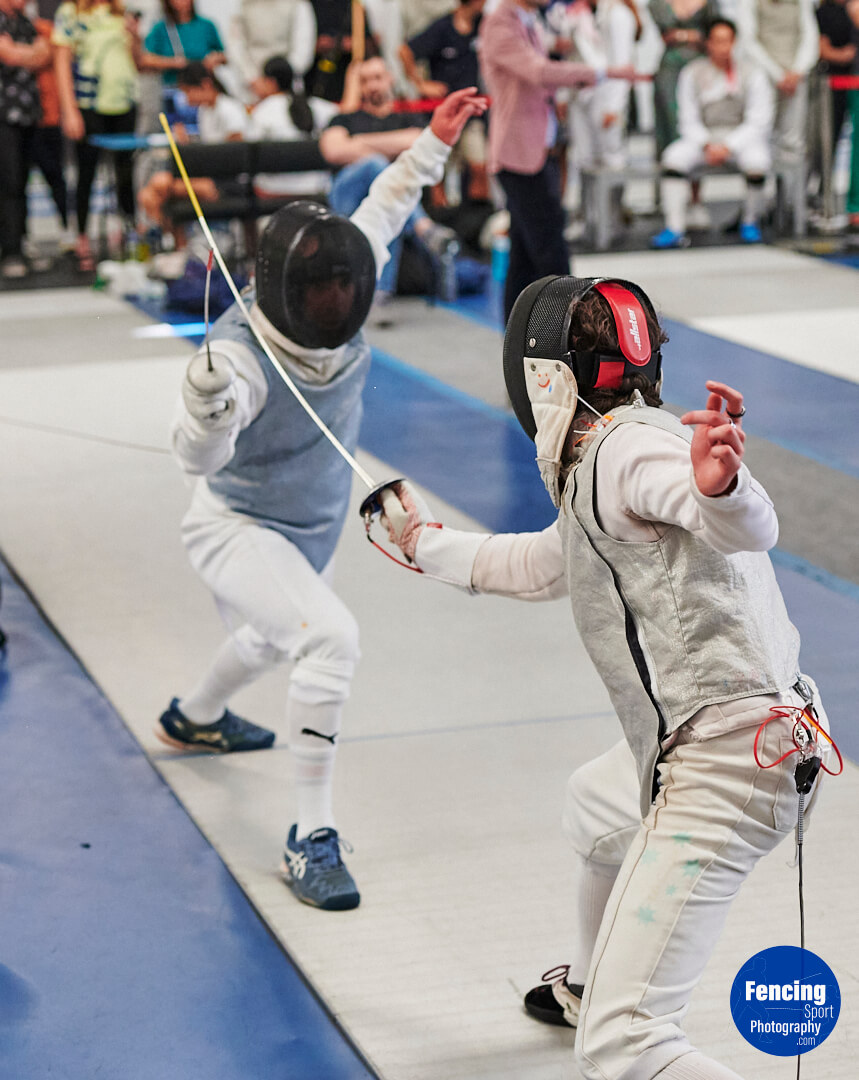
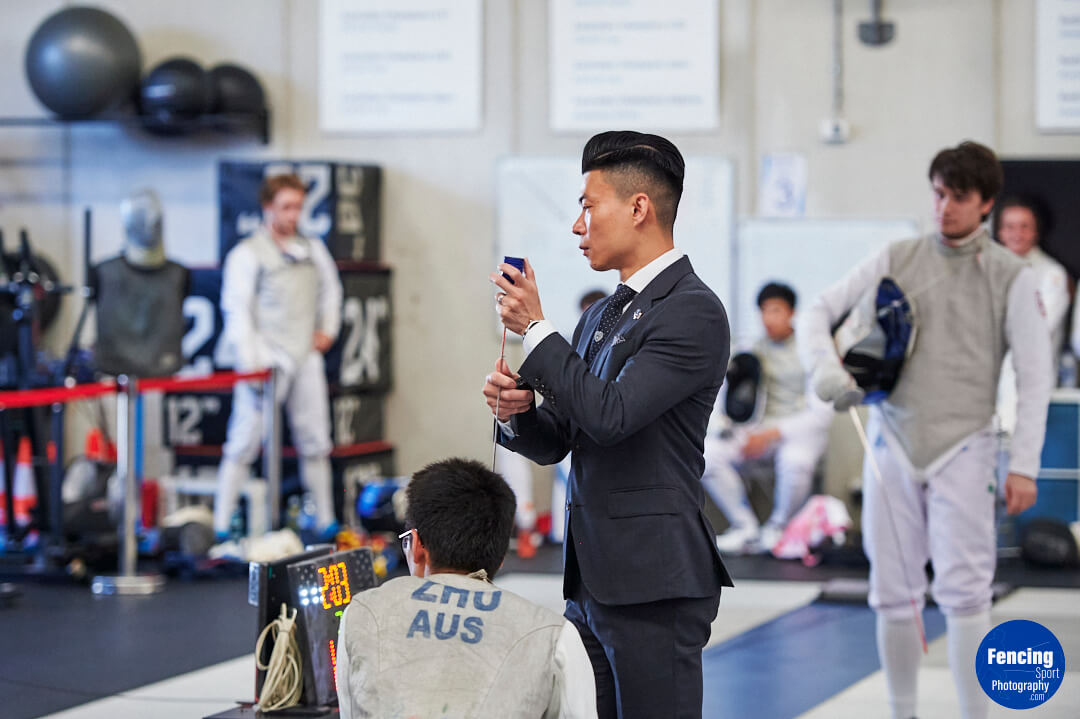
Ed: At the recent AFC 1 in Sydney, there was an international ref, was he from overseas and sent by FIE and what is his purpose in the AFC comp, does he further train the refs in Australia. I do recall seeing him on international comps on YouTube.
Kai: We often get international refs in for important AFC events. Howard Huang has now come twice, and he very frequently referees foil finals on the FIE circuit. He always gives super helpful advice, and helps us stay up to date with the current convention and explanation behind certain calls.
Ed: Do you ever get excited when reffing and look forward to any fencers that the head ref delegates?
Kai: I definitely look forward to reffing certain matches, and dread reffing others. It not only depends on the individual fencers but also the situations I think will be created when two particular fencers fence. For example, it can be difficult to referee matches where each fencer is very ‘preppy’ for a long time and then both go for fast attacks. I really enjoy refereeing matches that are dynamic with a lot of transitions forward and backward, rather than having both fencers dance in and out of distance.
Ed: There are few fencers with family members as ref or fencers.. how are these separated as ref in terms of conflict of interest
Kai: We have a conflict of interest sheet with anyone we coach or are related to/there is a conflict of interest for any other reasons. Also the DT try their best to ensure referees don’t ref fencers from their clubs and where possible their states.
Ed: When there is interference from the coach at comps, what happens? Assuming the coach should know comp rules interfering with ref’s decisions, this is especially during Semi and Finals. Given some of these coaches are also ref themselves at state comps
Kai: I think we should try to base what we do on what the FIE does in these situations.

Ed: What do you hope to see in the near and distant future of reffing in Australia? In terms of
New ref..
Kai: Trainee. I hope we can get some more young fencers involved with refereeing so they can view fencing from the perspective of a referee.
Ed: How should people go about it, from club’s perspective, from state and from Upper level.
Kai: I think clubs should try and encourage anyone with experience refereeing to try and teach other fencers how to referee during training. Maybe some clubs/state squads could get referees to come into training to kind of talk through the perspective of a referee, how to fence to a referee and also how to become one.
We have a great program in QLD that Nelson runs to get kids involved with refereeing during the schools fixtures each year.
INFORMATION
If you are a fencer based in Queensland and want to become a referee, reach out to Queensland Fencing for more information.
For other states in Australia, please ask your state centre.
